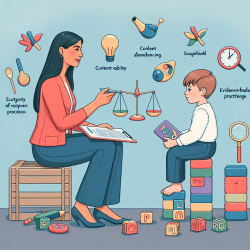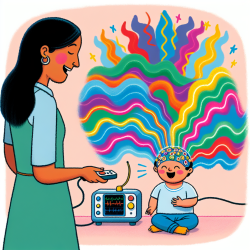The recent study titled Phonological Assessment Instrument: evidence of content validity and response processes provides valuable insights for speech-language pathologists (SLPs) aiming to improve their phonological assessment practices for children. The study emphasizes the importance of content validity and response processes in creating reliable and effective assessment tools. Here’s how practitioners can leverage these findings to enhance their assessment skills and outcomes.
Key Findings and Their Implications
The study focused on validating a phonological assessment instrument designed for children. The instrument was evaluated by both expert and non-expert judges to ensure its effectiveness in a clinical setting. Here are the key takeaways:
- Content Validity: The instrument underwent rigorous evaluation by expert judges, resulting in a Content Validity Index (CVI) of 0.98, indicating high content validity.
- Response Processes: The study also assessed the ease or difficulty with which children could respond to the assessment items, providing insights into the practical application of the instrument.
- Internal Consistency: The instrument demonstrated a high internal consistency with a Cronbach's Alpha of 0.844, indicating reliable inter-item relationships.
Implementing the Findings in Clinical Practice
SLPs can utilize these findings to improve their assessment strategies. Here are some actionable steps:
- Use Validated Tools: Prioritize using assessment instruments that have undergone rigorous validation processes, like the one discussed in the study. This ensures that the tools are both reliable and effective.
- Understand Response Processes: Pay attention to how children respond to assessment items. Use techniques like hints, close methods, and delayed imitation to facilitate accurate responses.
- Prioritize Spontaneity: Encourage spontaneous speech during assessments to obtain a more accurate representation of the child's phonological abilities.
Encouraging Further Research
While the study provides robust evidence for the validity of the phonological assessment instrument, further research is essential for continuous improvement. Practitioners are encouraged to contribute to ongoing research efforts by:
- Participating in Studies: Engage in research studies to validate new assessment tools and methods.
- Sharing Clinical Insights: Provide feedback based on clinical experiences to help refine and improve assessment instruments.
- Staying Updated: Keep abreast of the latest research and advancements in phonological assessment to ensure best practices.
To read the original research paper, please follow this link: Phonological Assessment Instrument: evidence of content validity and response processes.










